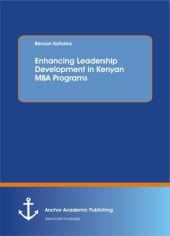 Neuerscheinungen 2016Stand: 2020-02-01 |
Schnellsuche
ISBN/Stichwort/Autor
|
Herderstra▀e 10
10625 Berlin
Tel.: 030 315 714 16
Fax 030 315 714 14
info@buchspektrum.de |

Benson Katulwa
Enhancing Leadership Development in Kenyan MBA Programs
2016. 184 S. 71 Abb. 220 mm
Verlag/Jahr: ANCHOR ACADEMIC PUBLISHING 2016
ISBN: 3-9548988-7-X (395489887X)
Neue ISBN: 978-3-9548988-7-9 (9783954898879)
Preis und Lieferzeit: Bitte klicken
The purpose of this study is to investigate the extent to which MBA graduates perceived their MBA education experience to have contributed towards the development of global leadership competencies in their lives. The collected data related to what the respondents perceived to have observed vis-Ó-vis what they would have considered adequate for the development of global leadership competencies. Stratified sampling technique was used to select the respondents using disproportionate allocation of respondents within strata. Data relating to the key research objectives were analyzed using nonparametric tests specifically the Chi-square goodness of fit test and Wilcoxon signed ranks test.
┤Text sample:
Chapter 2: LITERATURE REVIEW:
2.1 Introduction:
The quality and relevance of the MBA education has been a matter of concern and debate to both practitioners and academicians in many parts of the world (Beck-Jones & Harper, 2009; Bolden, 2007; Bruce, 2010; Hill, 2006; Mathews & Edwards, 2005; Robbins, Bradley, Spicer, & Mecklenburg, 2001; Sulaiman & Mohezar, 2009; Zhao, Truell, Alexander & Hill, 2006). There is therefore, need to review and improve the quality of MBA programs in order to make business education more relevant to the needs of the graduates aspiring to serve in a fast changing business environment.
2.2 From Management Education to Leadership Education:
The difference between managerial and leadership roles has become more pronounced over the last few decades. Zaleznik (1977) who was among the first scholars to highlight the difference between the two roles perceived that, leaders and managers are essentially different types of people, and hence the conditions favorable to the growth of one may he contrary to the others. Underlying Zaleznik┤s argument is the fact that leaders develop differently from managers and therefore a different approaches are appropriate for the development of each.
Kotter (1990) took Zaleznik┤s insights further and pointed out that, while managers promote stability, leaders press for change and that, organizations need both to thrive during turbulent times. Kotter┤s distinction between leadership and management lies within the key function and the activities involved in each role. In terms of function, management is about coping with complexity while leadership is about coping with change. Kotter┤s distinction of the two roles of management and leadership emphasized the need to apply the right approach depending on the desired result.
To produce effective leaders for the 21st century therefore, MBA programs must go beyond equipping business students with knowledge and skills for planning, budgeting, organizing and staffing. Besides these functional skills and knowledge, business schools ought to endeavor to develop global leadership competencies relevant to the global business environment in which the students will operate.
In spite of the recognition that leadership and management are two distinct and necessary complementary roles in organizational development (Buhler, 1995; Kotter, 2000), many traditional MBA programs continue to treat leadership as a subset of management. In many management textbooks and MBA programs, the topic of leadership receives a casual mention, and in many instances, it is omitted altogether (Bosrock, 2007). This perhaps explains the strong functional orientation towards management knowledge and skills which makes traditional MBA programs strong in developing managers but weak in preparing effective business leaders for turbulent and complex business environment.
To develop leaders for the 21st century, MBA programs need to design their curricula in a way that strikes a healthy balance between the content meant to develop managerial competencies and that focused on developing leadership competencies. That way, the graduates from such programs will be able to function effectively in the complex business environment within which they will operate.
2.3 The Need for Leadership Development:
Hitt, Black and Porter (2005) identified change, technology and globalism as the three most serious challenges facing the 21st century managers. To overcome this challenge, the manager must learn to get things done through people. This in turn requires one to be proficient at assessing other peoples┤ capabilities; matching people┤s capabilities with appropriate responsibilities and motivating people.
De Meyer (2010) went further and identified eight key trends happening at an accelerating scale hence making leadership education crucial. These include;
- Growing internatio


